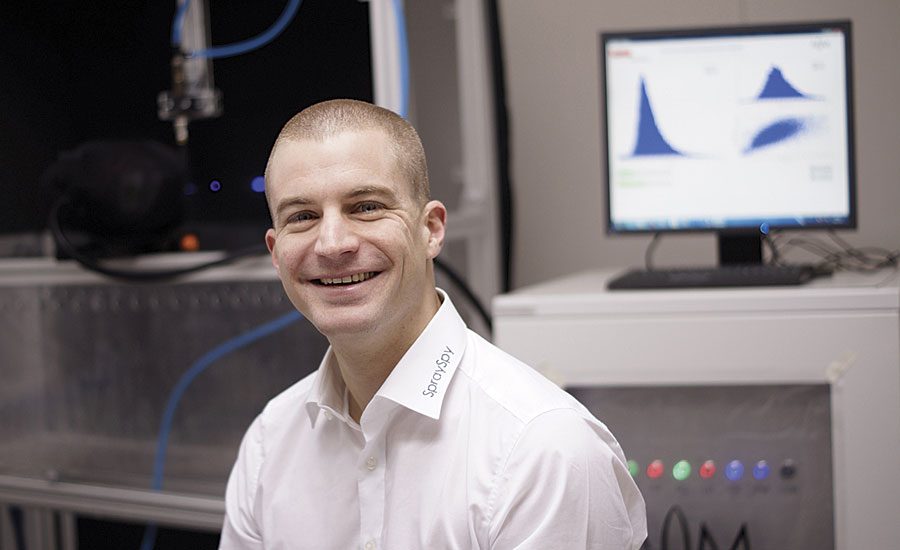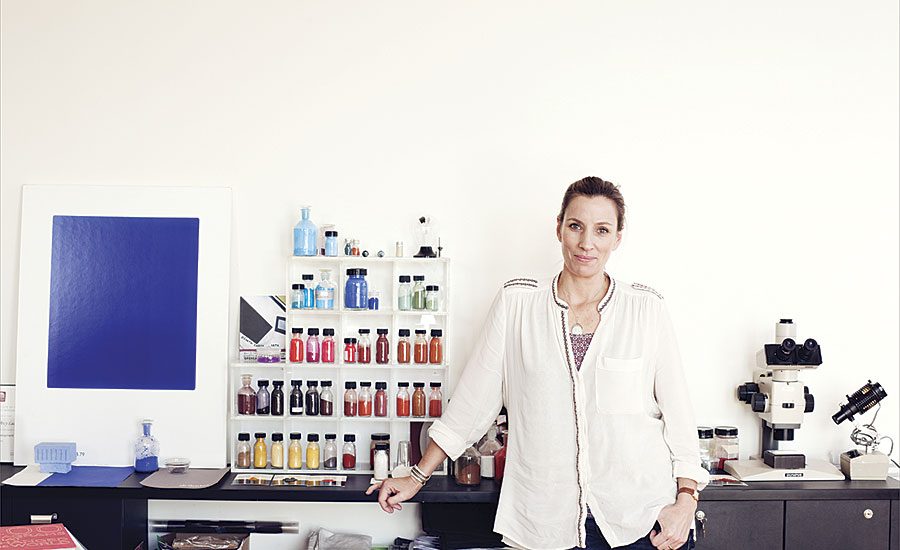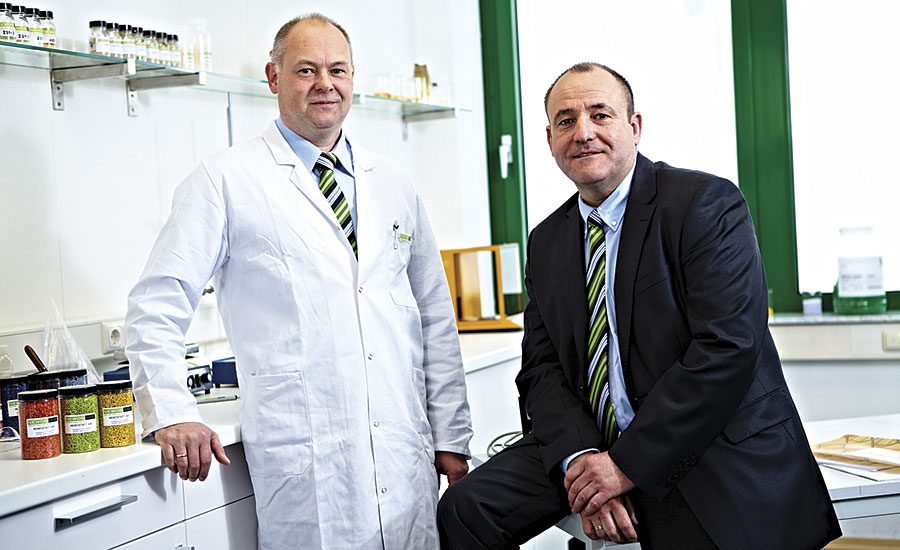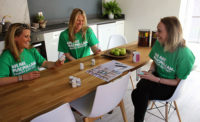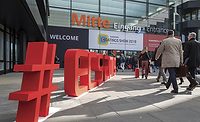The German Federal Ministry for Economic Affairs and Energy sponsored the booths of nine innovative young companies, focusing on a variety of technologies, products and services, at the European Coatings Show (ECS) this year. PCI spoke with the company representatives on the spot, as well as with three further small start-up companies.
AKS Coatings GmbH, Altlussheim – Strong Protection with a Simple System
To increase focus on R&D, the founders of AKS Coatings decided to start their own company in 2014. In addition to its four founders, the company employs one other staff member.
Technical specialists Andreas Klein and Wolfgang Hemmer developed a special, high-performance polymer silicate coating system, AKS-PS, to protect concrete and steel from aggressive substances such as acids, chemicals and sea water. According to Commercial Manager Stefanie Stirbu, the product is highly resistant to chemicals and heat, and is solvent- and amine-free. “It is even more resistant than traditional solvent-containing coatings,” said Stirbu. “Thanks to its good adhesion, AKS-PS, which is applied in a single layer, ensures that there is no rust creepage beneath the coating,” she added
AKS-PS is designed for industrial construction, including both on- and off-shore facilities. It is also suitable for use in the agricultural sector and is currently being tested for further applications.
For more information, visit www.aks-coatings.de.
AOM-Systems GmbH, Griesheim – Detecting the Details of Drops
SpraySpy®, developed by AOM-Systems, is a new sensor for spray characterization, often an essential monitoring or diagnostic task in process engineering, for example in spray drying or paint spraying. According to Dr. Meiko Hecker, co-founder of AOM-Systems GmbH, SpraySpy can be used to analyze sprays in greater detail and under more realistic conditions than conventional equipment. “It is the only one-sensor backscattering system; therefore it is the only system that needs just one optical access point. SpraySpy is also the only one-sensor system that measures the size, velocity and momentum of non-transparent droplets and particles,” said Hecker. In addition, it can help to improve quality monitoring and process automation for paint spray or spray drying processes, thereby enhancing product quality and reducing production costs.
“The droplets go through the laser and acquire reflections on the surface,” explained Hecker, “We catch the reflection, which allows us to calculate the size, velocity and kinetic energy of droplets or particles.”
SpraySpy started as a Ph.D. thesis, which resulted in a prototype. The company, a spin-off from the Technical University of Darmstadt, was founded in 2013 and currently employs a staff of five as well as three students.
For more information, visit www.aom-systems.com.
BellandTechnology AG, Pottenstein – Bonding Forever? Not Always!
Temporary bonding and coating with specially developed polymers were the focus of BellandTechnology at the ECS. “What makes BELLAND®Polymers unique is that, although they are insoluble in water, they can be transformed from a solid to a dissolved state in an aqueous alkali solution,” said Dr. Frank Osan, CTO of the company.
BELLAND Fix&Clear is a film for thermal bonding that can be used for temporary applications, for example during dicing (cutting), drilling, grinding or polishing processes, as well as in required testing procedures.
The polymer is also suitable for temporary coating, for example to protect metals or the surface of high-quality optical lenses from scratches, as well in the production of structured surfaces by different printing processes. The adhesive layer of BELLAND Fix&Clearand the coating dispersion can be easily removed without leaving any residue, restoring the material to its former state.
“The new bonding tape is distinguished by high shear resistance and it does not stain the machined material,” explained General Manager Werner Fieder. “Since no organic solvent is necessary (the process is VOC-free), no expensive and sophisticated safety precautions are required.”
BELLAND Polymers, which are all true thermoplastics, can be processed using conventional production equipment.
For more information, visit www.bellandtechnology.de.
Drikolor, Los Angeles, USA and Auckland, New Zealand – “Stirred not Shaken”
With a mother who owned a paint business, Rachel Lacy was well placed to set up her own company, which she did in 2012. Lacy’s aim was to sell color separately from paint, an approach that completely changes the distribution channels. She developed a process that she says is “as easy as stirring sugar into coffee.”
The dry pigment is simply stirred into an aqueous white or clear base. No tinting wheel and no shakers are required. “You can do it at home with a kitchen spatula,” said Lacy. Applications are the decorative and architectural paint markets.
“We started with just me,” she laughed. “I was CEO, COO, CTO and tea lady!” Gradually a team was built up, starting with Lacy’s husband, who handles the operations in New Zealand. Then came a CTO, a management team, a colorist, an administrative assistant, three Ph.D. students and a chemist studying for a Master’s. Shareholder-funded, the new company raised money to build a production plant in Wellington, New Zealand. In addition to Lacy, Drikolor now has 12 employees in New Zealand and two in the United States.
“We’re going to be a hundred million dollar company,” predicts Lacy. “We have lots happening on the IP front. For example, we are currently developing colors for 3D printed concrete and structural color.”
For more information, visit www.drikolor.com.
EASYTEC GmbH, Roetgen – Saving Time and Energy
This technology company develops, engineers and manufactures high-end products for automating and optimizing the energy efficiency of machines, components, plants and processes. These include cost-saving and environmentally compatible high-power UV LED radiators designed to the individual requirements of customers in industries such as timber and furniture, plastic and paper foil, printing, automotive and electronics.
“We have developed a special UV LED technology for surface curing,” said Alfred Feilen, Managing Director and founder of the company. “Our system is unique in that our machines provide an irradiance of 32 watts per square centimeter, enabling energy consumption to be reduced by 75 percent versus conventional equipment, and increasing service time to 50,000 hours. He added that the company’s cold curing systems are a very important feature for the foil industry, for example.
Feilen founded EASYTEC in 2009. “I saw a very big market in this technology,” he explained. “When we started, I was the only employee. Today, we have eight people.” Business is growing from year to year, according to Feilen, and the number of customers showing an interest has greatly increased since the company was started.
For more information, visit www.easytecgmbh.de.
H.C. Carbon GmbH, Rednitzhembach – “As Much Chemistry as Necessary and as Little as Possible”
Managing Director Werner Handl started H.C. Carbon in 2008 with more than 25 patents to his name. The company offers carbon dispersions for electrical and thermal conductive coatings, heat dissipation applications and water-based lubricants for metal forging. Most of the products are currently applied in the automotive industry. H.C. Carbon employs a staff of five, including Handl, who is responsible for Research & Development. The other employees are mainly sales people.
“We don’t just sell products,” said Handl. “We sell cost saving.” He went on to explain how the company helps customers improve productivity and quality. “Our products provide even coatings and excellent adhesion, and this can prolong the life of molds, for example, which are very expensive.”
All the products are water-based and VOC-free. H.C. Carbon aims to continuously improve its products and to become more international, opening up business in the Chinese and Middle East markets. “The ECS is a really international show,” concluded Handl.
For more information, visit www.hc-carbon.de.
matchmycolor LLD, Basel, Switzerland – Connecting the World of Color
A management buyout from former Ciba, matchmycolor, which was founded in 2009, is a one-platform color management system developed for the graphic arts, cosmetics, paints, plastics, fibers and ceramic industries. According to the founders, Dr. Michael Jakobi and Judy van de Langkruis, matchmycolor offers a unique combination of IT services and color know-how, resulting in new, advanced technical software solutions.
“The single, easy-to-use platform and concept allow us to focus on one technology, matchmycolor Colibri®, which is efficient in terms of the number of operators and the reusability of our software code,” said Managing Partner Dr. Jakobi. “Another important feature is our physical and mathematical models, which are based on comprehensive know-how and continuous development.” matchmycolor covers the entire color management process from design, through color specification to finished product. The company works together with Konica Minolta, which is the main sales channel for matchmycolor and bundles its color measurement equipment with matchmycolor software. The business is global, extending over Europe, South East Asia, China, the Americas, the Middle East and South Africa.
matchmycolor currently employs 10 people, including the two managing partners, as well as a number of freelancers. “It was the chance of a lifetime to run my own business,” said Jakobi. He explained that business in 2014 had been very satisfactory and he was optimistic about 2015. “I am convinced we will grow the business and gain market share,” he concluded.
For more information, visit www.matchmycolor.com.
NEWOS GmbH, Geretsried – Adopting the Personal Approach
Founded in 2009 by Michael Newel and Jürgen Ostermann, NEWOS® GmbH currently produces and markets three product lines for the plastics industry. NEWOLAN® rheology additives for PVC processing, e.g., for floor coverings, have been developed to eliminate dilatancy in plastisols, resulting in higher coating speeds and the associated economic benefits. NEWOTEC® de-aerators are designed to reduce the amount of air incorporated during processing and to accelerate the release of air bubbles after mixing, shortening mixing times and maximizing transparency. NEWOTEC wetting and dispersing additives allow better distribution of fillers and pigments. NEWOSTAT® antistats help to reduce the tendency of plastics to attract dust. Applications include PVC flooring, wallcoverings and synthetic leather.
“We can offer our customers commercial and technical benefits,” said Michael Newel, “because we don’t just focus on the product but on the whole solution.” Jürgen Ostermann added, “Our customers have complex testing procedures, and we offer them solutions based on their individual needs.” NEWOS has a staff of six, including its two general managers. The products are custom manufactured at a site in Menen, Belgium. In 2011, production capacity was doubled. The company plans to diversify and develop further products.
For more information, visit www.newos.eu.
OERTER GmbH & Co. KG Applikationstechnik®, Solingen – “Quality is not a Coincidence”
Physicist Ulrich Oerter founded his company in 2006. OERTER produces laboratory spraying machines, mainly for quality testing of paints and raw materials. The machines paint test panels under defined and reproducible conditions. These panels are used for a wide variety of tests, including thickness, colorimetry, scratch and stone shot. They give reproducible results, according to Oerter, and serve as a basis for further, bulk trials.
“We develop and produce machines for conventional pneumatic and electrostatic bell applications,” explained Oerter. Highlights of the company’s production range are the painting machines of the APL production series. The four models of the series are designed to ensure the highest technical standards and cover all requirements within the range of conventional pneumatic painting. The high-end model APL 6.0 was specially developed for the operation of electrostatic high-rotation atomizers and simulates state-of-the-art painting processes from automobile production.
In addition to General Manager Oerter, the company employs six people, most of them electrical mechanics. Business is worldwide and customers include leading global chemical and automotive companies.
For more information, visit www.oerter-apl.de.
ORONTEC GmbH & Co. KG, Dortmund – More Performance for the Paint Industry
With three machines of its own design, ORONTEC provides hardware for measuring paint properties. One of the three systems, Q-Chain® LCM, measures the color of paint in the liquid state during the manufacturing process. Managing Partner Ralph Jan Wör-heide emphasized, “We focus on more than technological testing: we support our customers actively in bringing processes under control in order to avoid corrections. Our measuring devices are tools designed to achieve higher performance for the paint industry. Process engineering is an important part of our portfolio of products and services.”
Measuring paint in the liquid state reduces the testing time needed, says Wörheide, because it can be integrated in the production process and the same operator can control testing and manufacture. Liquid testing also allows the manufacturer to check quality consistency of the ingredients. “Our target is zero corrections,” explained Wörheide. He pointed out that ORONTEC is not in competition with companies that perform tests on the finished item. “We add a further competence by bringing scientific methods into the manufacturing process, enabling process improvements.”
“What makes our machines special is their high repeatability, which is comparable with or even better than that achieved with dry measurement,” said Senior Partner Dr. Karl-Friedrich Doessel. “We can even measure effect pigments,” he continued.
Wörheide and Managing Partner Hendrik Hustert founded the company in 2014. They intend to introduce the machines to more manufacturing sites and Research & Development departments. ORONTEC is already working with a cooperation partner in China and has further international plans in the pipeline.
For more information, visit www.orontec.com or www.q-chain.com.
Phase 17 GmbH, Waltrop – Helping Companies Make Investment Decisions
“When companies plan changes to their processes, it’s hard to tell in advance what the effect will be,” said Dr. Martin Breucker, Managing Director of Phase 17. To help them make investment decisions, Breucker gathers data and maps processes. “Once you have the process model, you simulate alternative scenarios, for example investments or personnel allocation, calculate process costs and identify (new) bottlenecks. Then you can make sure the investment makes sense and start implementing the changes,” he explained.
Breucker founded Phase 17 in 2010. The company provides consulting services to coatings, raw materials and adhesives manufacturers, focusing on analysis, optimization and simulation of production processes. These services help companies make decisions on investment in production plants, personnel allocation, for example shift systems, new production processes and new product ranges. Asked about the company’s name, Breucker said, “Phase 17 is the last phase of a 6Sigma project. You take the insights gained from one project and transfer them to the next one.”
Phase 17 currently has a staff of two, plus one part-time employee. Breucker intends to grow the business and diversify. His aim is to create a stronger link between raw materials, equipment and paint manufacturers.
For more information, visit www.phase-17.com.
ras materials GmbH, Regensburg – Less is More
A spin-off from rent a scientist, a company that provides R&D services, ras materials, founded in 2010, manufactures ECOS™ silver nanowires and silver nanoparticles. The company was set up because “we had customers who wanted new functions and new materials,” explained Dr. Oliver Zech, Head of Business Development.
Designed for applications such as smartphone displays, the silver nanowires are 10-40 micrometers long and have a diameter of 50 nanometers. Percolating ensures that the randomly oriented nanowires make the entire substrate conductive. “10 grams of silver wire can coat 200 square meters of conductive foil,” said Zech. He added that the substrate remains transparent.
The company also manufactures silver nanoparticles for use in antimicrobial additives, one advantage being that an amount of only about 0.05 percent is needed. Applications include coatings, polymers and fibers for sectors such as textiles, electronics, household goods and medical and dental care.
ras materials and rent a scientist together employ 20 people. The company intends to continue focusing on nanomaterials and to develop a broader portfolio.
For more information, visit www.rasmaterials.com.
Enthusiasm and Optimism Prevailed
Involved as they are in widely diverse fields, the new companies have a common focus: continuous development of sustainable and environmentally acceptable products and processes. Many of them were set up at a time of economic insecurity and upheaval. All their representatives described their willingness to accept the risk involved in starting a business and all showed enthusiasm about their products, optimism regarding the future and strong commitment to their activities. They all said that their presence at the ECS was an important opportunity to network, make new contacts and grow their businesses.

